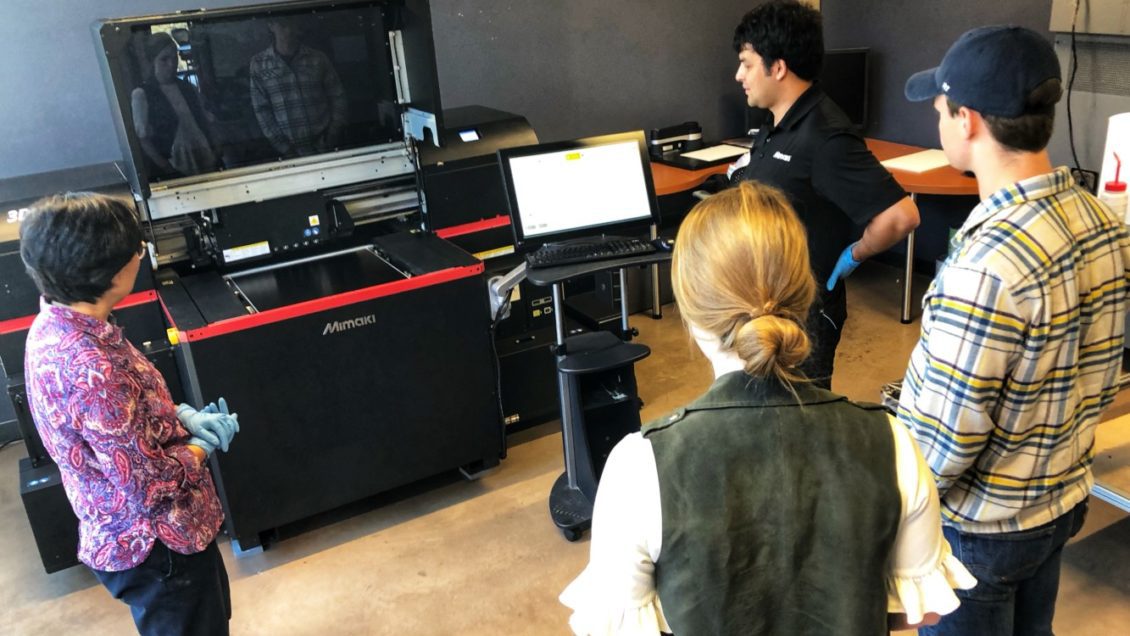Students will learn hands-on about 3D printing workflow and advanced prototyping

CLEMSON, South Carolina — Mimaki USA has placed a full-color commercial 3D printer at Clemson University’s Sonoco Institute for Packaging Design and Graphics for students to learn about the 3D printing workflow and create detailed product and package samples.
The printer produces photorealistic prototypes using inkjet technology and water-soluble support materials for quick and simple model-finishing. It can achieve more than 10 million colors using CMYK, white and clear inks.
“The Sonoco Institute is a leader in package design and graphics and Mimaki is proud to partner with them to provide hands-on experience with our full-color 3D technology,” said Josh Hope, senior manager, 3D printing and engineering projects at Mimaki USA. “Our 3DUJ-553 printer will allow students to create color-accurate prototypes that complement their current curriculum as well as give them the opportunity to develop industry skills they can use outside the classroom.”
“We are all very excited at Clemson to continue our partnership with Mimaki, especially in such a rapidly evolving area as 3D printing,” said Chip Tonkin. Sonoco Institute director and chair of the graphic communications department. “We have a great group of faculty with wide-ranging expertise in printing and packaging who are ready to make use of the new equipment.”
 The Mimaki 3DUJ-553 was placed at Clemson University for educational and research initiatives and resides in the Sonoco Institute’s Packaging Supply Chain Computer Lab, which houses the full scope of package design and prepress software. Initially, the new printer will be utilized in two courses at the institute: 3D Printing Workflow (GC 4900) taught by Shu Chang and Product/Package Design and Prototyping (PKSC 2200) taught by Haley Appleby.
The Mimaki 3DUJ-553 was placed at Clemson University for educational and research initiatives and resides in the Sonoco Institute’s Packaging Supply Chain Computer Lab, which houses the full scope of package design and prepress software. Initially, the new printer will be utilized in two courses at the institute: 3D Printing Workflow (GC 4900) taught by Shu Chang and Product/Package Design and Prototyping (PKSC 2200) taught by Haley Appleby.
“My goal is to teach students the uniqueness of 3D printing,” said Chang. “I want to show that it is beneficial for reducing the number of individual parts in a product and its assembly process, and can be used to create unique forms, fits and functions.”
Students in Chang’s class will have the know-how to both design and print in 3D, which Chang said is “expanding to every area of the manufacturing world.”
Students in Appleby’s design and prototyping class compete to see their original designs printed in 3D at the end of the course. The top five projects from each semester will adorn the halls of the institute.

“What I love about my class is that students design a perfume or cologne bottle, and after we 3D print it, they can test its functionality,” Appleby said. “Does the threading around the neck perform as it should? Does the cap fit around the spray head? Are the walls of the bottle too thick or thin? How far off are the design tolerances?”
Appleby noted that when students have tangible, printed products in their hands, they are able to understand more about the technical and functional aspects of design.
“It’s really exciting to have the 3D printer here because it allows us to take our visions, design our products in SolidWorks and transform them into real-life, functioning objects,” said Madeleine Risinger, packaging science sophomore in PKSC 2200. “I can’t wait to see how my ‘Bahama Mama’ perfume bottle’s frosted glass texture and colors come together when printed.”
Mimaki equipment is also used extensively in multiple labs in graphic communications. Students use the Mimaki UJF-6042 MkII UV flatbed printer and JV150-160 wide-format printer for package prototyping, proofing, specialty printing projects, banners and more. The CFL-605RT flatbed plotter and CG-130SRIII roll plotter are used for die-cutting many packaging and design projects as well as specialty large-format graphics.
“When companies rapid-prototype their designs before moving forward in their workflow, they can quickly see design flaws, make changes and perform consumer studies on an accelerated timeline,” Appleby said.
Mimaki USA
Headquartered in Suwanee, Georgia, Mimaki USA develops cutting-edge digital printing and cutting products that include hardware, software and associated consumables. Click here or visit MimakiUSA.com to learn more about Mimaki’s 3D printing technology.
Sonoco Institute of Packaging Design and Graphics
The Sonoco Institute of Packaging Design and Graphics at Clemson University is a hub for innovation in package design and printing in Clemson. Click here or visit SonocoInstitute.com to learn more about the Sonoco Institute at Clemson University.
Get in touch and we will connect you with the author or another expert.
Or email us at news@clemson.edu

